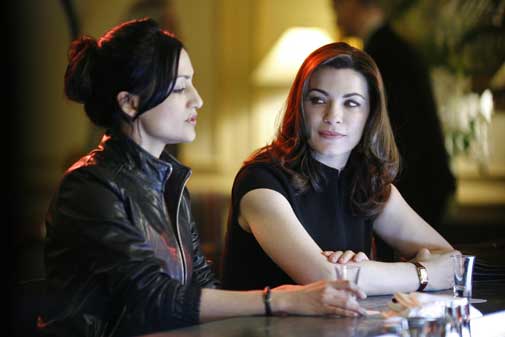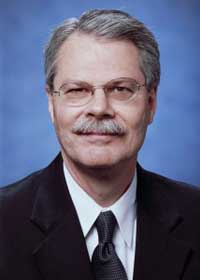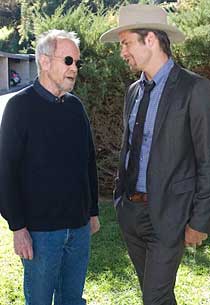
The 2011 Peabody Awards presentation Monday at New York's Waldorf-Astoria was a celebration of excellence, attended by recipients and subjects whose sheer variety exemplified the wide-ranging Peabody standard. Over there, Yoko Ono. Over there, Julianna Margulies. And over there, Spike Lee, Timothy Olyphant, Patrick Stewart and Temple Grandin...
Most of them, and dozens of others, ascended the stage to pick up Peabody Awards, say thanks, and offer a few remarks. Some honorees, like Stewart (who won for his PBS Great Performances production of Macbeth), begged for continued support for the Corporation for Public Broadcasting, which he said was "under direct ideological attack."
Others, like The Good Wife co-executive producer Robert King," got off memorable zingers.
"We'd like to thank two people," King said, "who are helping us write stories for next year: Arnold Schwarzenegger and Dominique Strauss-Kahn"...
Larry King, the luncheon's master of ceremonies, recalled a Peabodys ceremony long ago (1980, when he won a Peabody for his Mutual radio talk show) in which Alistair Cooke addressed the crowd of winners and said something King never forgot. Cooke told the crowd that 98 percent of the people who worked in broadcasting were followers. "The other two percent," Cooke observed, "are in this room."

Spike Lee, who was awarded Peabody for his HBO documentary If God Is Willing and Da Creek Don't Rise (thus gaining a Peabody to match the one awarded its sister-series predecessor, When the Levees Broke), demonstrated that his sympathy continues for the victims of Hurricane Katrina and its aftermath.
"I'd like to thank the great people of New Orleans," Lee said, "who can't catch a break."
And Temple Grandin, the real-life inspiration for the Peabody-winning HBO telemovie (of the same name) about her starring Claire Danes, turned seamlessly from autistic inspiration to artistic TV critic: "This movie," she said, "it's really a good thing!" (And she's right.)
Ray Romano, a winner for his work as both co-creator and co-star of TNT's Men of a Certain Age, asked rhetorically, "How did THIS happen? I'm afraid they're going to ask me to be on Jeopardy now."
He admitting to Googling the Peabodys, and becoming impressed and a bit embarrassed by being included with the august company he was keeping. Then, addressing his wife of 23 years, who was seated at his table: "Maybe NOW you'll watch the show. Come on!"
Googling the Peabodys, actually, isn't a bad idea.
(But isn't necessary. For TVWW contributor Noel Holston's wonderful inside history of the Peabody Awards, in his latest THE GRASSY NOEL column, click HERE.
My report on the announcement of this year's Peabody winners can be read HERE...
And the official Peabody website can be found HERE.)
What a history. What good shows, and what good taste.

"Few institutions," Peabody director Horace Newcomb said at the start of the luncheon, "have maintained their purpose with such clarity for so long." That's not hyperbole, just fact.
A few days before the ceremony, I phoned Dr. Newcomb to ask him a few questions about this year's entries and winners.
"This year," he said, "it was a great year for documentaries across the board." HBO was particularly impressive, he said, but so were many of the 300 so or entrants, a lot of which depended upon some kind of public and foundation support.
The threat to reduce public support for public broadcasting concerned Newcomb in that context, he said, but he also found the current creative climate somewhat paradoxical. While funding support may be shrinking at some levels, so are production costs.
"With the reduction in cost of equipment, and the ability to just shoot miles and miles of video and then edit it with some ease," he said, "that may be part of the reason we're seeing the numbers of documentaries go up...There are opportunities out there, if someone can put together enough money to get something going."
"It's this moment where public finding probably is not as strong as it could be," noted Newcomb, who just finished presiding over his 10th Peabody Awards deliberation and presentation, "yet people continue to turn out outstanding work."
Finally, asked how the Peabody committee decides whether to be ahead of the curve in bestowing its official blessing on a work of radio or TV, Newcomb offered a tantalizing peek behind the curtain.
"If we think it's going to be an ongoing series," he said, "the debate can be very deep. We say, should we step out this year, or should we wait a year? Obviously, we often wait. The Good Wife [a CBS drama series awarded the Peabody in its second season] -- it had been discussed before. Certainly, it's held up, it may even have gotten better.

"And with something like [FX's] Justified, we say, well, let's take a chance -- there are enough people in this room who say this is excellent, and we want to go with it."
Later Monday night, at a Paley Museum gathering honoring the newest Peabody winners, writer Elmore Leonard (seen at right, with series star Timothy Olyphant), who wrote the novella on which the series and its characters were based, gave Justified his highest praise -- something he hasn't dispensed freely on previous film and TV adaptations of his works.
"I like it," Leonard said. "I love it. They're even using my lines."
"No wonder you like it," series writer and executive producer Graham Yost playfully said of the original pilot, noting that whenever he was struck for inspiration, he'd just lift lines of dialogue directly from Leonard's story. "It's exactly yours."
In addition to the fidelity to word and spirit, Elmore Leonard also has to love the workload.
He sold his first story, a Western, to Argosy magazine, in 1951, 60 years ago, for $1000, when he was making $135 a month, and has never looked back. Now,for two years on Justified, he's getting much more than that, and without necessarily expending that much effort.
"I'm an executive producer," Leonard said with a wry smile, "but I'm not doing anything."
Not true at all. He's suggesting things. He's writing new stories featuring Raylan Givens, the U.S. Marsal brought to such vivid life by Timothy Olyphant.
And, hey -- he just won a Peabody.